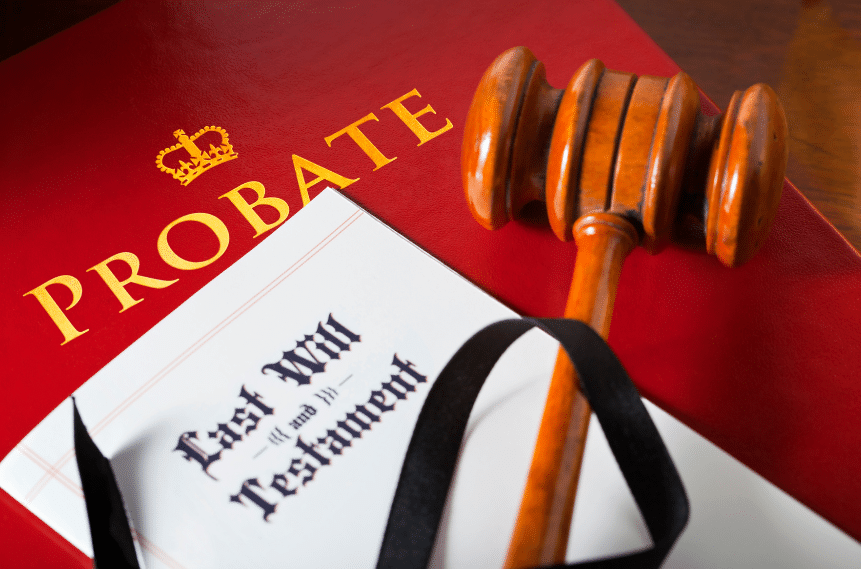For so many people who lose a loved one, the idea of probate becomes a daunting thought. Do I call an attorney? Are there deadlines I need to worry about? How do I get started?
First, it is important to understand that not every asset passes according to the provisions of a person’s Will. Instead, assets generally pass in one of four ways:
- Joint Titling: If an individual owns accounts, real estate, or other assets titled with another person as “Joint Tenants with Rights of Survivorship,” then upon death, the jointly titled asset immediately becomes an asset that is wholly owned by the surviving owner without probate or any legal action necessary. In some states, there’s a form of joint ownership reserved for spouses called “Tenancy by the Entirety” that works the same way; when one spouse dies, the survivor immediately owns the joint asset.
- Beneficiary Designations: Whenever we buy life insurance or establish retirement plans, we complete beneficiary designations. These are forms on file with the life insurance company or plan custodian directing them as to who to distribute our death benefits or plans to once we pass away. When that ultimate day arrives, these assets pass directly to the individuals listed on those designations in the manner specified therein; not through our Wills (unless designated that way on our forms).
- Trust Ownership: Many people establish various types of trusts while engaging in estate planning and transferring assets to those trusts. As a result, the assets titled in the name of such trusts are administered according to the provisions of the trust documents and, unless the trusts direct any such assets to one’s estate, they do not pass according to the provisions of that individuals’ Will at death.
- Individual Ownership: Assets that are titled in an individual’s sole name (not as Joint Tenants with Rights of Survivorship or Tenants by the Entirety), and that do not have an associated beneficiary designation, pass under one’s Will, and are what we call “probate assets.”
Understanding that only individually titled assets pass under your Will, let’s understand the basics of a Will. The Will’s purposes are mainly to provide how probate assets are to be distributed upon death, how inheritance taxes (if any) are to be assessed against those assets, and to appoint an Executor, or personal representative, to oversee and assume responsibility for carrying out the Will’s direction. When you are alive, you have the legal authority to make and affect decisions about your assets; when you pass and the probate court officially appoints your Executor, one of the Executor’s key roles is to step into your shoes to have the authority to manage your assets in your place.
This brings us to the key question at hand: a loved one has passed and has a Will; now what?
The individual to serve as Executor must prepare a petition to probate the deceased individual’s (the “decedent’s”) Will. Probate is a formal, legal process to prove the Will is indeed the decedent’s last will and testament, and to appoint an Executor or personal representative. Essentially, the probate petition describes the decedent’s Will, who the decedent’s heirs-at-law are, as determined under the relevant state law, and any special circumstances relating to the Will, heirs, and/or the decedent for the Court to be aware of. There are different forms that must be filed with the Court depending on circumstances relating to the Will, the heirs, the beneficiaries, and how the Will was signed.
Ideally, all heirs will sign a form to demonstrate that they acknowledge the Will to be submitted is the true and accurate Will and that they have no argument against the probate of said Will; in Georgia, this is called an “Acknowledgement of Service and Assent to Probate Instanter.” If heirs cannot be located, are unable to sign such a form, or are potentially likely to cause trouble for the probate process, an attorney may guide the Executor to notify the heirs about probate – which is itself a requirement for probate – via alternative methods (e.g., having them served with a copy of the petition and the Will).
Once a probate petition is prepared, the best practice in Georgia is for the named Executor to visit the probate court in the county where the decedent lived in person. Depending on the state and county, each Court will have its protocol as to how best to plan the Executor’s visit. In some places, an Executor may schedule an appointment, while in others it is advisable to visit the court on a particular day during specified hours. If an in-person visit causes a hardship for the Executor, he/she may consider filing the petition by mail and arranging to either take his/her oath (described below) in the county where he/she resides with a document called a “Commission to Administer Oath,” or, where permitted, he/she may be able to swear his/her oath via Zoom or other virtual platform.
When the Executor ultimately walks into the probate court, he/she will need to bring the following with him/her, at a minimum:
- The complete probate petition, including all necessary signatures from the Executor and heirs, notarized where necessary;
- An original death certificate issued by the state of residence of the decedent at the time of his/her death;
- The original last will and testament (the one with ink signatures!), along with any original codicils (legal amendments to the Will); and
- A checkbook (or, where accepted, a credit card) to pay any fees the court will charge.
Ultimately, the court clerk will review everything, may ask some questions, and will administer an oath to the Executor, during which the Executor will swear that he/she will fulfill all of his/her duties in administering the Will. The court will subsequently issue a document called, “Letters Testamentary,” which will serve as the Executor’s proof to the world that he/she has authority to act on behalf of the decedent’s estate. Some courts will issue this document while the Executor is present, and others may send the Letters Testamentary to the Executor at a later date. Requesting several copies of Letters Testamentary at the outset of the probate process may eliminate avoidable future hassle, as third parties holding the decedent’s assets (asset custodians, banks, wealth managers, etc.) will all need original Letters Testamentary.
Once an Executor has his/her Letters Testamentary, he/she must fulfill certain requirements of probate and carry out his/her responsibilities as required under the Will and law.
While this article provides a broad overview of what may be expected based on the knowledge of Georgia law, the process, fees, and requirements for probate vary from state to state (and even from county to county). Although it is possible to prepare a probate petition and administer an estate without the assistance of an attorney, consultation with legal counsel is advisable to provide for a thorough and efficient probate process, to ensure that the Executor is fulfilling all his/her duties, and to address inheritance and income taxes, beneficiary notification requirements, and other considerations relevant to the estate.
If you have any questions or would like to discuss the probate process further, please reach out to your client service team, or call 404.264.1400. You can also visit us on the web at HomrichBerg.com.
Important Disclosures
This article may not be copied, reproduced, or distributed without Homrich Berg’s prior written consent.
All information is as of date above unless otherwise disclosed. The information is provided for informational purposes only and should not be considered a recommendation to purchase or sell any financial instrument, product or service sponsored by Homrich Berg or its affiliates or agents. The information does not represent legal, tax, accounting, or investment advice; recipients should consult their respective advisors regarding such matters. This material may not be suitable for all investors. Neither Homrich Berg, nor any affiliates, make any representation or warranty as to the accuracy or merit of this analysis for individual use. Information contained herein has been obtained from sources believed to be reliable but are not guaranteed. Investors are advised to consult with their investment professional about their specific financial needs and goals before making any investment decision.
©2023 Homrich Berg.


